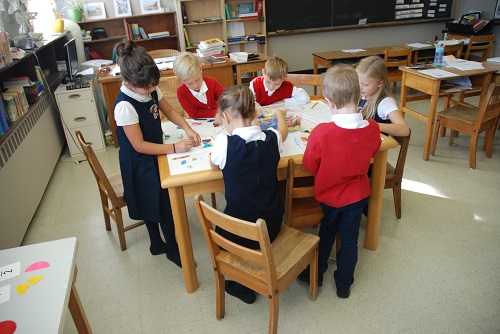Catholic Liberal Arts Education
The goal of a Catholic Liberal Arts education is to lead a student to virtue and wisdom, educating them for life.
Traditionally, classical liberal arts educators refer to the three stages of cognitive development: grammar, logic and rhetoric (known collectively as the Trivium). The grammar stage gives the youngest students the foundational building block of facts and information for all future learning. In this stage, students utilize their naturally keen memorization skills to learn to read, write, and spell; and know the basic nature of numbers. The logic stage focuses on comprehending the relationships between the previously learned information, as well as assessing causes and effects. During this stage, the methodology reflects the argumentative nature of the budding adolescent. The rhetoric stage involves deeper materials and discussion as well as frequent debate. This stage brings to light the detailed and creative expression of what has been learned, reflecting the older teen’s natural desire to be heard and to sway others. Teaching methods in a liberal arts education cater to these stages.
Other identifying aspects of a Catholic Liberal Arts Education include:
- teaching the “Great” literature
- teaching frequently through stories
- grammar, phonics and spelling rules
- memorized math facts
- use of the Socratic method of dialogue whereby a teacher, through careful questioning, assists in leading students to discover truths
- a deep immersion in and knowledge of history and the stories of history
- study of Latin
